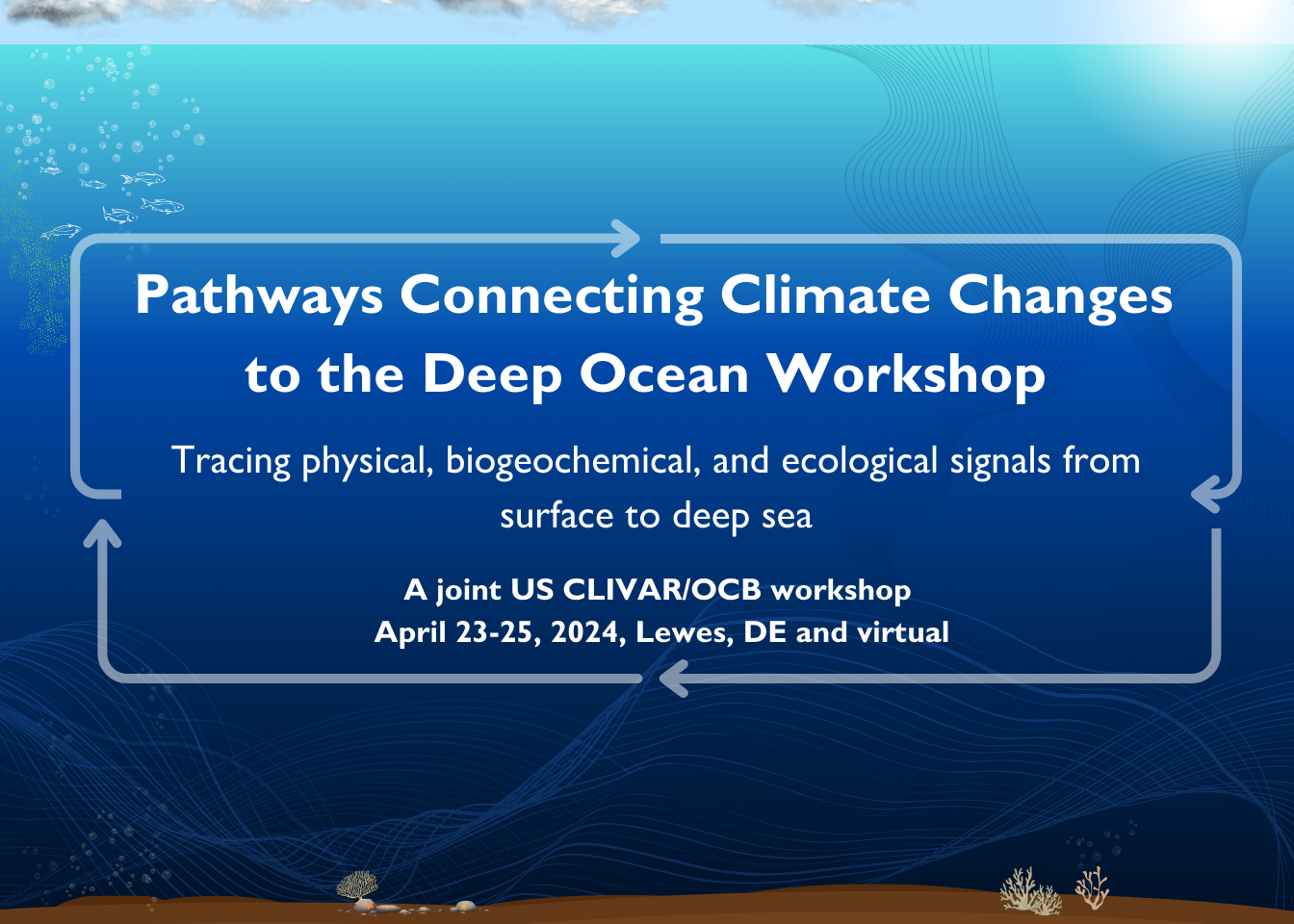Pathways Connecting Climate Changes to the Deep Ocean: Tracing Physical, Biogeochemical, and Ecological Signals From Surface to Deep Sea Workshop
Bring together observational oceanographers and modelers across physical, biogeochemical, and ecological communities to assess our understanding of pathways connecting the surface to the seafloor and to develop recommendations for improved detection and attribution of change in the global deep ocean system.
Background
The deep ocean is a significant but under-observed part of the Earth system. This vast volume of water can store heat and carbon dioxide for hundreds to thousands of years and hosts rare and fragile ecosystems. The limited observations that have been made in the deep ocean reveal changes in recent decades, such as warming, freshening, de-oxygenation, acidification, and other biogeochemical changes. While constraining these physical and biogeochemical processes is a challenge, the assessment of associated changes of life in the deep ocean remains equally, if not more, elusive as collocated ecological and biological observations are virtually non-existent.
Another aspect to elucidate is how changes in the deep ocean are connected to forcings at the ocean surface. Overturning circulation connects the surface and deep oceans over very long timescales. Mesoscale eddies, strong convection, and particle sinking are mechanisms that link the surface and seafloor at much shorter timescales. The relative importance of these and other potential processes in propagating surface climate change signals to the deep ocean remains unknown.
Tight coupling between ocean circulation, biogeochemistry, and life in the deep sea necessitates an extensive exchange of data and knowledge across ocean science disciplines. With deep-ocean biodiversity losses observed or anticipated in many areas, there is an urgent need for bolstering these exchanges and co-designing both observational campaigns and modeling experiments to understand, monitor, and predict deep ocean evolution under climate change and other anthropogenic stressors.
Objectives
We will bring together observational oceanographers and modelers across physical, biogeochemical, and ecological communities involved in climate research and ocean exploration to develop a collective set of requirements for improved characterization of baseline state and variability, as a prerequisite to enable detection and attribution of change in the deep ocean system. More specifically, the workshop aims to:
- Provide an updated comprehensive assessment of the deep ocean’s state and changes across disciplines, of key quantities in which these changes are expressed, and of pathways and timescales connecting the surface to the seafloor.
- Review existing observation and modeling tools and their adequacy for constraining, understanding, and attributing changes in the deep ocean system. Identify critical knowledge and observational data gaps and model deficiencies.
- Develop a collective set of recommendations for improved detection and attribution of change in the global deep ocean system, with a focus on better serving and supporting deep ocean science across disciplines.
- Build an interdisciplinary network of ocean modelers and observers across disciplines. Our aim is to open communication channels and facilitate collaborative exchange of data, knowledge, and tools across communities.
Participants
The workshop welcomes the participation of scientists from fields across the ocean observing and modeling communities, spanning physics, biogeochemistry, and ecology. We welcome insights from highly localized to global-scale studies as well as efforts focused on individual disciplines, but we strongly encourage all participants to consider how their work can increase opportunities for other disciplines/communities to have a collective impact.
We also encourage participation from relevant oceanographic networks and observing campaigns (e.g., Deep Argo, BGC Argo, GO-SHIP (Global Ocean Shipboard Hydrographic Investigations Program) and Bio-GO-SHIP, JETZON (Joint Exploration of the Twilight Zone Ocean Network), ECCO and ECCO-Darwin (Estimating the Circulation and Climate of the Ocean), DOSI (Deep Ocean Stewardship Initiative), Challenger-150, PICES (North Pacific Marine Science Organization) to ensure broad disciplinary representation and connectivity to established programs.
Format
This 2.5-day workshop will be hybrid, with both in-person and virtual participation options. The schedule will include plenary sessions, poster sessions, and breakout discussion sessions.
Outcomes
The major deliverables will include:
- Community building across modeling and observational communities, the climate and ocean exploration communities, as well as across physical, chemical, and biological oceanography disciplines studying the deep ocean
- Consensus state of understanding of the connectivity of the surface and deep ocean
- Prioritized recommendations to improve understanding, observations, and prediction of climate impacts on the deep ocean and strategies for supporting them
The organizing committee will share results with the broader community through a workshop report, a review paper in Oceanography or BAMS, and an ESRI StoryMap.
Scientific Organizing Committee
Xinfeng Liang (co-chair, University of Delaware)
Monique Messié (co-Chair, Monterey Bay Aquarium Research Institute)
Leslie Smith (co-Chair, Your Ocean Consulting LLC, DOOS Project Director)
Isabela Le Bras (Woods Hole Oceanographic Institution)
Patrick Heimbach (University of Texas at Austin)
Helen Pillar (University of Texas at Austin)
Zachary Erickson (NOAA/PMEL)
Cristina Schultz (Northeastern University)
Charlie Stock (NOAA/GFDL)
Program Organizing Committee
Heather Benway, OCB
Alyssa Johnson, US CLIVAR
Mai Maheigan, OCB
Jessica Martinez, UCAR CPAESS
Mike Patterson, US CLIVAR
Mary Zawoysky, OCB
Workshop Sponsors


